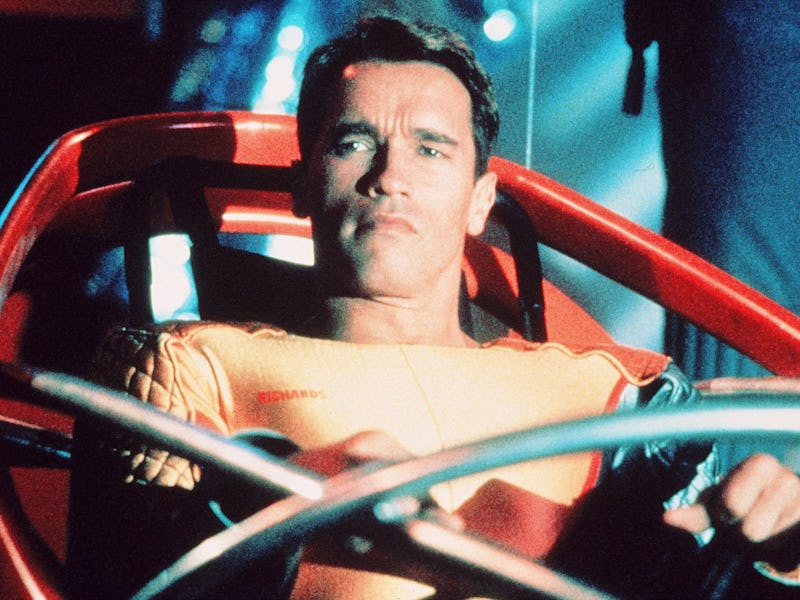You need to watch the best Schwarzenegger sci-fi thriller before it leaves HBO Max this month
In 1987, one Arnold Schwarzenegger movie made wild guesses about the future. What did it get right?

It’s always fun to see how the past predicts the future. Even if the specifics are wrong, the broad strokes being right can make a dumb movie feel intelligently prescient.
Enter Arnold Schwarzenegger. From the 1980s and into the 1990s, Arnie was Hollywood’s premier beefcake action star, and he made his reputation with a notable number of science fiction movies. While Predator, The Terminator, and Total Recall are more celebrated, there’s one dystopian sci-fi flick Schwarzenegger starred in that has moments of brilliance hidden in a package of total cheese.
Loosely based on Stephen King’s 1982 novel (written under the pen name Richard Bachman), The Running Man is the sci-fi movie you need to check out before it leaves HBO Max on March 31.
Directed by Paul Michael Glaser, The Running Man takes place in the bleak future of 2019. Disgraced cop Ben Richards (Schwarzenegger), framed for the mass murder of unarmed civilians, is forcibly entered into the world’s most popular TV show: The Running Man. Like The Hunger Games meets American Gladiators, The Running Man is a live game show in which criminal contestants run for their lives and fight against seasoned murderers, called stalkers. Throughout his ratings-breaking broadcast, Ben competes while pursuing Damon Killian (Richard Dawson), the mastermind and charismatic host.
Dystopic as our time can feel, it’s comforting to know we’ve not met the specific savagery of The Running Man. While game shows have made a surreal comeback in the streaming era, they’re mostly centered on people hooking up rather than fighting for survival. Even Survivor is primarily about the dramatic stakes of personal schemes.
But like most sci-fi flicks of the ‘80s, the 21st century seen in The Running Man is uncomfortably close to ours when it comes to the broad strokes. It’s a world plagued by vast income inequality, dwindling resources, manipulative media, and a public sedated by consumer products and dumb entertainment. Late in the film, digital body doubles call to mind the sophisticated tech of A.I. machine learning and deepfakes. And while the U.S. Justice Department doesn’t have an “Entertainment Division,” like The Running Man ominously reveals, the Pentagon has been involved with Hollywood for years.
Released in 1987, The Running Man, starring Arnold Schwarzenegger, depicts a dystopic future that gets some things right about our present.
Structured like a video game, The Running Man is centered around action set-pieces focused on specific stalkers; call it Boss Battles: The Movie. Ice hockey goon Subzero (played by wrestler Toru Tanaka) chases Schwarzenegger around a deadly rink, while the domain of Fireball (Jim Brown) is an industrial factory. It’s all very silly, and this alone makes up the brunt of the movie’s fun. Thank heaven, because the wooden script doesn’t carry its weight, but credit to the filmmakers for thinking in stylistic terms. It’s unsurprising that an arcade classic, 1990’s Smash TV, would take so many cues from The Running Man.
Unlike Total Recall and The Terminator, the filmmaking is rudimentary rather than innovative. It’s peak ‘80s in all the boring ways, and so it’s little wonder Schwarzenegger disliked making it. In his 2012 book, Total Recall: My Unbelievably True Life Story, the actor blamed Glaser’s decision to shoot like a TV show. One can’t blame Glaser for trying to mimic the mercenary production of game shows, but The Running Man was still a movie and Schwarzenegger felt Glaser sacrificed “all the deeper themes.”
In a 2017 interview with Vice, screenwriter Steven de Souza reflected on the film under the shadow of President Trump’s inauguration. "Everyday this year, I turn around there's another example of how stuff in the movie is coming true. I just want to say, it's not my fault,” he said. But he did acknowledge how the movie is still a fantasy. In the film, proof of Richards’ innocence is broadcast to the world, which inspires outrage. In the real world, it’s never that simple. "The biggest downer of this movie is the idea that when the video tape surfaces showing that Killian has lied, everyone is instantly outraged and rises up," de Souza said. "We've heard the tapes and seen the tapes, and it's had no effect. In real life, everyone goes right back to Facebook."
It’s a pretty awful feeling that even a dark, dystopic movie like The Running Man ash a more hopeful outlook than we can in the real world.
The Running Man is streaming on HBO Max until March 31.
This article was originally published on